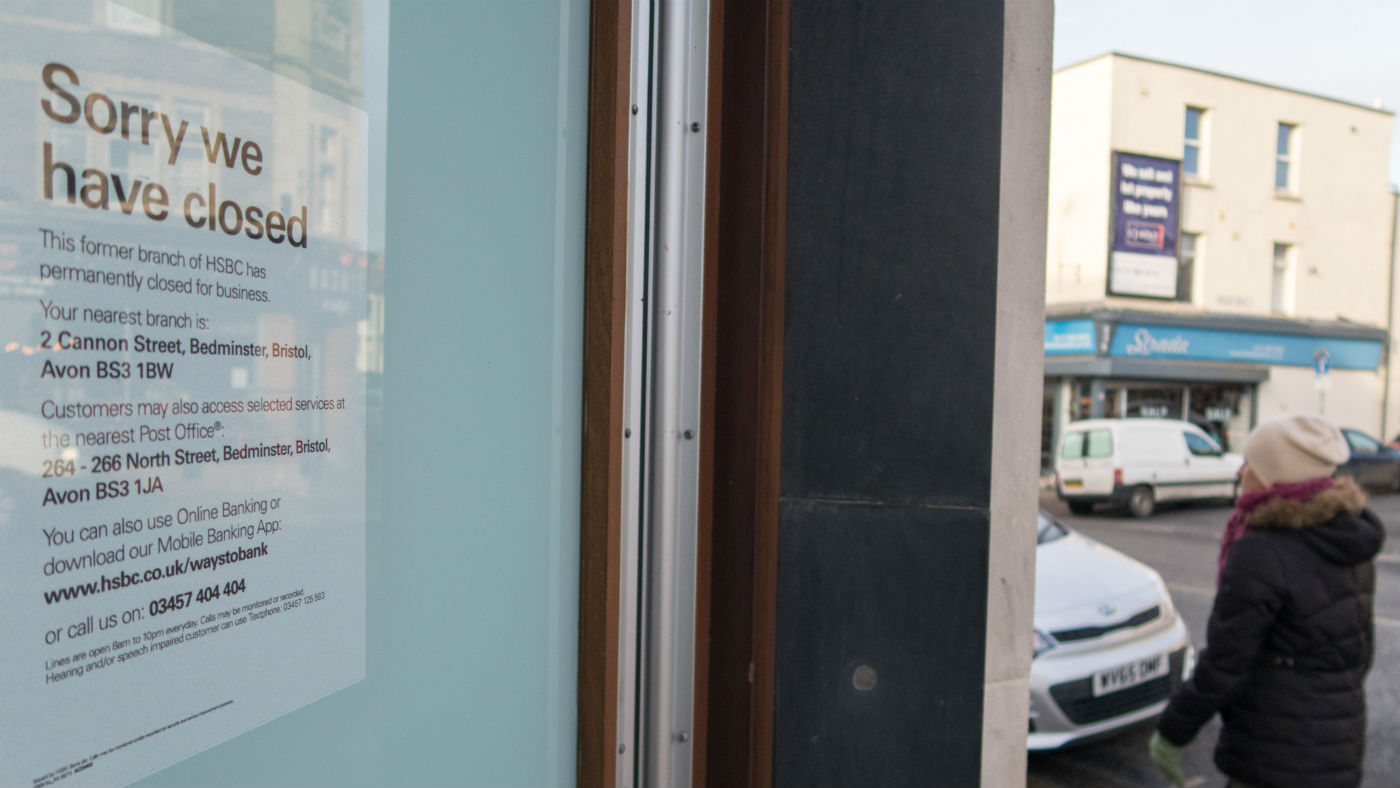Could ‘banking hubs’ solve problem of branch closures?
MPs fear large sections of society could face ‘financial exclusion’

A free daily email with the biggest news stories of the day – and the best features from TheWeek.com
You are now subscribed
Your newsletter sign-up was successful
MPs have urged banks to created local hubs in towns where branch closures could leave customers financially excluded.
The Treasury Select Committee has been looking at ways of dealing with the fallout of mass bank branch closures, which have left large sections of society having to travel miles to their nearest branch or relying on online and mobile services which have proved vulnerable to IT failures.
The number of bank branches per million people in the UK has fallen 37% from its peak, according to a report by McKinsey, and the country has relatively fewer branches than most of its European and North American peers.
The Week
Escape your echo chamber. Get the facts behind the news, plus analysis from multiple perspectives.

Sign up for The Week's Free Newsletters
From our morning news briefing to a weekly Good News Newsletter, get the best of The Week delivered directly to your inbox.
From our morning news briefing to a weekly Good News Newsletter, get the best of The Week delivered directly to your inbox.
AOL News says “bank branch closures are particularly likely to affect the elderly or people on lower incomes” so “preserving a branch network, therefore, should help financial inclusion”.
“As things stand, when the last bank in an area shuts down, customers are ushered towards the nearest Post Office to do their banking,” says the BBC, “but while you can take out and deposit money and check your balance, there is no banking specialist on hand and you can't get help setting up basic transactions like direct debits”.
Furthermore, the Post Office actually makes a loss from providing limited bank services, something the Committee said should not be subsidised by tax payers.
“The Post Office is not an optimum environment for customers, particularly vulnerable ones, for banking services as staff are typically not banking specialists. Rather, the service provided is comparable to that of an ATM” says the report. “The Post Office should not be seen as a replacement for a bank branches, but a complimentary proposition where available.”
A free daily email with the biggest news stories of the day – and the best features from TheWeek.com
Under its proposals, the big four banks Lloyds, Barclays, HSBC and RBS would fund local hubs, which could be in post offices, but would have specially trained staff.
In fact, three of the biggest, Lloyds, NatWest and Barclays have already joined forces to provide banking hubs for small businesses in Birmingham, Manchester, Crosby, London, Leicestershire and Bristol.
The Financial Times says the hubs “which will have longer opening hours than traditional branches — will allow businesses to pay in money and cheques and exchange cash”, and comes amid rising concerns increased costs could make it too expensive for small companies to process cash.
In Scotland the deputy first minister, John Swinney, has suggested different banks take turns using the same office on alternate days.
With growing concern about branch closures and the impact of a growing cashless society, “there could be a future for the banking hubs idea if ministers can be persuaded to get behind it”, says the BBC.
-
 Political cartoons for February 16
Political cartoons for February 16Cartoons Monday’s political cartoons include President's Day, a valentine from the Epstein files, and more
-
 Regent Hong Kong: a tranquil haven with a prime waterfront spot
Regent Hong Kong: a tranquil haven with a prime waterfront spotThe Week Recommends The trendy hotel recently underwent an extensive two-year revamp
-
 The problem with diagnosing profound autism
The problem with diagnosing profound autismThe Explainer Experts are reconsidering the idea of autism as a spectrum, which could impact diagnoses and policy making for the condition
-
 The Silicon Valley Bank collapse
The Silicon Valley Bank collapsefeature Sudden failure of tech sector’s go-to bank sparks fears of wider contagion
-
 Labour shortages: the ‘most urgent problem’ facing the UK economy right now
Labour shortages: the ‘most urgent problem’ facing the UK economy right nowSpeed Read Britain is currently in the grip of an ‘employment crisis’
-
 Will the energy war hurt Europe more than Russia?
Will the energy war hurt Europe more than Russia?Speed Read European Commission proposes a total ban on Russian oil
-
 Will Elon Musk manage to take over Twitter?
Will Elon Musk manage to take over Twitter?Speed Read The world’s richest man has launched a hostile takeover bid worth $43bn
-
 Shoppers urged not to buy into dodgy Black Friday deals
Shoppers urged not to buy into dodgy Black Friday dealsSpeed Read Consumer watchdog says better prices can be had on most of the so-called bargain offers
-
 Ryanair: readying for departure from London
Ryanair: readying for departure from LondonSpeed Read Plans to delist Ryanair from the London Stock Exchange could spell ‘another blow’ to the ‘dwindling’ London market
-
 Out of fashion: Asos ‘curse’ has struck again
Out of fashion: Asos ‘curse’ has struck againSpeed Read Share price tumbles following the departure of CEO Nick Beighton
-
 Universal Music’s blockbuster listing: don’t stop me now…
Universal Music’s blockbuster listing: don’t stop me now…Speed Read Investors are betting heavily that the ‘boom in music streaming’, which has transformed Universal’s fortunes, ‘still has a long way to go’